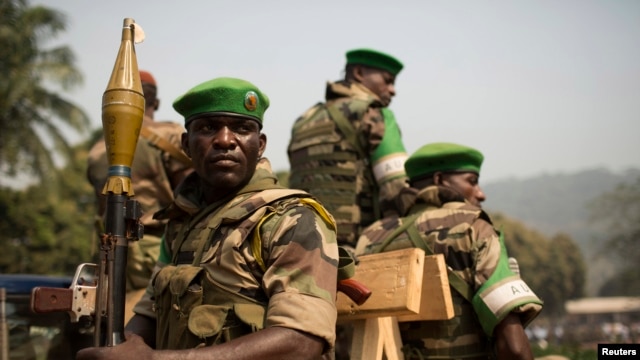Soldiers from the AU peacekeeping mission prepare to leave at the end of a speech given by Alexandre-Ferdinand Nguendet, the head of Central African Republic's transitional assembly at the Gendarmerie headquarters in Bangui on Jan. 13, 2014.
The deputy chairman of the African Union says his organization is working closely with officials of the Central African Republic (CAR) to stabilize security there as the country prepares to elect a new interim transitional president Monday.
Erastus Mwencha says the resignation of former interim leader Michel Djotodia and Prime Minister Nicolas Tiangaye presents an opportunity for the CAR to reorganize and establish a functioning government that will meet the aspirations of the people and return the country to constitutional rule.
“We are encouraged to see that with the departure the ex-president and the prime minister, the Central African Republic has now got quite an excellent opportunity to reorganize their government -- to put in place a more proactive government that can work with the international community to help them secure their country politically and also economically,” said Mwencha.
Under pressure from regional leaders, both Djotodia and Tiangaye recently resigned following a special security meeting organized by the Economic Community of Central African States (ECCAS).
“The change of leadership points to the seriousness that the leaders in the region attach to the changes. And the people of Central Africa have also welcomed this new dispensation with the departure of the president and the prime minister indicating that new leadership can overcome what the extremists have plunged this country into and find a way of Central African emerging from that,” said Mwencha.
Last July, the AU’s Peace and Security Council increased the troop levels of the African-led international support mission in the International Support Mission to the Central African Republic [MISCA] from 3,652 personnel to 6,000. The force includes military, police and civilians.
Rwanda has also promised to send troops to the mission. Mwencha says the AU has been helping Rwanda transport its troops to the CAR.
“What is important also is the political [situation]. The people of the Central African Republic [have that] responsibility because peace at the end of the day is for and by the people of Central Africa, and our role is to create an enabling environment for the people to gain stability and development for themselves,” said Mwencha.
Some observers have expressed concern that there are not enough MISCA troops to help end the wave of violence in the CAR. Mwencha says the AU has asked member countries to contribute troops to the African-led force.
“The numbers must be seen within the context of the atmosphere that was in Bangui and other environments. We hope with the changed atmosphere the attitude also on the ground will change,” said Mwencha. “There is need to give MISCA the space to see with this new environment whether peace will return….”
The deputy chairman of the African Union says his organization is working closely with officials of the Central African Republic (CAR) to stabilize security there as the country prepares to elect a new interim transitional president Monday.
Erastus Mwencha says the resignation of former interim leader Michel Djotodia and Prime Minister Nicolas Tiangaye presents an opportunity for the CAR to reorganize and establish a functioning government that will meet the aspirations of the people and return the country to constitutional rule.
“We are encouraged to see that with the departure the ex-president and the prime minister, the Central African Republic has now got quite an excellent opportunity to reorganize their government -- to put in place a more proactive government that can work with the international community to help them secure their country politically and also economically,” said Mwencha.
Under pressure from regional leaders, both Djotodia and Tiangaye recently resigned following a special security meeting organized by the Economic Community of Central African States (ECCAS).
“The change of leadership points to the seriousness that the leaders in the region attach to the changes. And the people of Central Africa have also welcomed this new dispensation with the departure of the president and the prime minister indicating that new leadership can overcome what the extremists have plunged this country into and find a way of Central African emerging from that,” said Mwencha.
Last July, the AU’s Peace and Security Council increased the troop levels of the African-led international support mission in the International Support Mission to the Central African Republic [MISCA] from 3,652 personnel to 6,000. The force includes military, police and civilians.
Rwanda has also promised to send troops to the mission. Mwencha says the AU has been helping Rwanda transport its troops to the CAR.
“What is important also is the political [situation]. The people of the Central African Republic [have that] responsibility because peace at the end of the day is for and by the people of Central Africa, and our role is to create an enabling environment for the people to gain stability and development for themselves,” said Mwencha.
Some observers have expressed concern that there are not enough MISCA troops to help end the wave of violence in the CAR. Mwencha says the AU has asked member countries to contribute troops to the African-led force.
“The numbers must be seen within the context of the atmosphere that was in Bangui and other environments. We hope with the changed atmosphere the attitude also on the ground will change,” said Mwencha. “There is need to give MISCA the space to see with this new environment whether peace will return….”


No comments:
Post a Comment